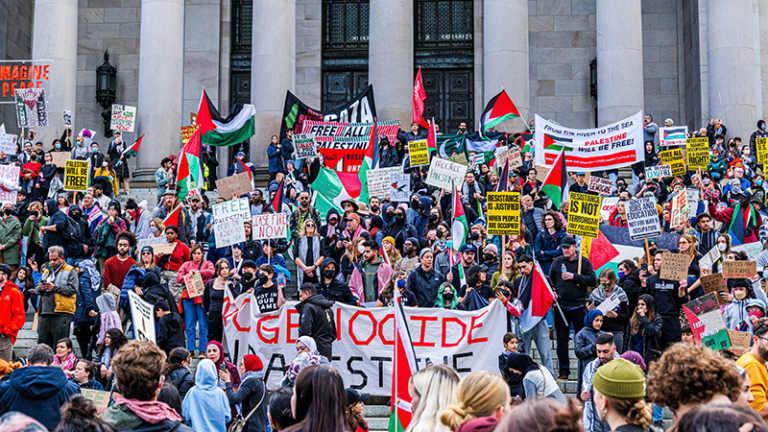
For decades, Israel enjoyed strong bipartisan backing from Americans. But in recent years, there has been a measurable shift in public opinion away from this traditional position. While the Biden administration and a majority in Congress remain rooted in their pro-Israel stance, support for the Palestinian cause appears to be growing among the American public, especially among younger Americans. The disconnect between youth opinion and US government policy has notably widened since Israel launched its massive military campaign in response to Hamas’s surprise attack on October 7.
Major American university campuses and cities have become battlegrounds for protests, with pro-Palestinian students loudly condemning Israel for its massive and indiscriminate bombing campaign in Gaza and the US government for giving it a green light. Campuses also have witnessed calls for a ceasefire and for justice for the Palestinians caught in the deadly crossfire between Hamas and the Israeli military. The rise in pro-Palestinian sentiment in the United States, especially among young voters, raises important questions. Will the increasing support for Palestinian justice and peace force changes in US policy toward Israel? Will the American youth who favor a ceasefire in Gaza cost President Joe Biden his re-election?
The October 7 Attack and What Followed
On October 7, Hamas launched a surprise attack on Israel, firing thousands of rockets into the country and infiltrating the iron wall security barrier surrounding the Gaza Strip since 1994. Militants attacked multiple Israeli towns, army bases, and a music festival, killing about 1,200 and kidnapping some 240 others. Hamas’s bloody assault not only shocked Israel, whose leadership failed to anticipate it despite ample intelligence warnings, but also stunned Israel’s allies, particularly the United States, who unanimously condemned Hamas and endorsed Israel’s right to defend itself. A day later, Israeli Prime Minister Benjamin Netanyahu formally declared war on Hamas, ordering a complete siege on Gaza to wipe the organization “off the face of the earth.”
Since October 7, Gaza has witnessed continuous devastating attacks on its people and civilian infrastructure. The death toll in Gaza has climbed over 22,000, with a majority of the dead being women and children. Some 7,000 Gazans are missing and believed to be buried under the rubble of residential buildings, 55,000 have been injured, and more than 1.8 million are internally displaced as they frantically flee violence. In the wake of October 7, President Biden repeatedly expressed unwavering US support, visited Israel, dispatched Secretary of State Antony Blinken on multiple trips to the Middle East, and pledged military aid. The House of Representatives and the Senate passed bipartisan legislation backing Israel and condemning Hamas.
Israel’s actions in Gaza and the mass destruction its forces have wrought have become a contentious topic in the United States.
There were members of Congress who expressed solidarity with the Palestinian people. Most notably, Representative Rashida Tlaib (D-MI) grieved the loss of both Israeli and Palestinian lives while calling for a path forward that includes Israel’s “lifting the blockade, ending the occupation, and dismantling the apartheid system that creates the suffocating, dehumanizing conditions that can lead to resistance.” Her calls for justice for Palestinians have been met with severe accusations of anti-Semitism from her colleagues, and the House, in a bipartisan vote, even censured her. Tlaib is not the only American whom Israel’s supporters accuse of promoting terrorism and being anti-Semitic. Others who have condemned Israel’s indiscriminate military campaign in Gaza also have been met with accusations of anti-Semitism and threatened with losing their jobs. Even those simply pushing for a ceasefire have faced such repercussions. Israel’s actions in Gaza and the mass destruction its forces have wrought have become a contentious topic in the United States, inviting serious trouble for those who dare not to toe the “party line” of staunch support for Israel.
Declining Support for Israel Among Young Americans
Such Americans, many of whom are Democrats under the age of 30, have not relented in their calls for a ceasefire and justice for the Palestinians, even in the face of threats by supporters of Israel. In recent years, more young Americans are turning away from the traditional pro-Israel stance and warming up to the Palestinians. A 2022 survey conducted by the Pew Research Center found that “adults under 30 are more inclined than older Americans to view the Israeli people unfavorably but the Palestinians favorably.” This trend has become even more evident since Israel’s October invasion of Gaza. A December 2023 New York Times-Siena College poll, for example, found that nearly three-quarters of voters between 18 and 29 years old disapprove of President Biden’s staunch support for Israel in the war. Support for the Palestinians, which typically has been associated with politically left-leaning individuals, has long been popular among college students aligned with the left. Today, with the most right-wing, anti-democratic, anti-Palestinian government ever ruling Israel, sympathy for the Palestinians as well as severe criticism of the Israeli government have increased among young Americans.
As the Gaza war rages on, young Americans’ pro-Palestinian views have become even more apparent. Tensions have been high on many university campuses, where students fight to ensure that the plight of the Palestinians is not going unnoticed. Through vigils, protests, and social media campaigns, young Americans have been working to create awareness of the devastation in Gaza and advocating for a permanent ceasefire. Students at elite universities, including Harvard, Columbia, and George Washington, have rallied to protest the collective punishment that Israel has been imposing on Palestinians and to condemn stakeholders who back Israel’s war on Gaza. This activism has put such universities in a precarious position as many donors and powerful alumni are backers of Israel, and universities have gone above and beyond to smear and silence pro-Palestinian students and organizations. The George Washington University (GWU), a politically charged university located in the heart of Washington, just a few blocks from the Department of State, has become a notable example of the struggle between university officials and pro-Palestinian students. In November, the university “suspended Students for Justice in Palestine at GWU from hosting and participating in on-campus activities for at least 90 days,” sparking outrage among pro-Palestinian students. The crackdown has not stopped students from continuing to organize protests, showing their deep dedication to Palestinian justice.
US Government Versus US Universities
Since October 7, a new battle has emerged: the expanding numbers of pro-Palestinian American youth versus the pro-Israel Congress and Biden administration. Many members of Congress have chosen to interpret the rise of pro-Palestinian campus activism as anti-Semitism, condemning it in the strongest terms. On October 19, for instance, the Senate passed a resolution condemning Hamas and “antisemitic” student activities on US college campuses. Lawmakers, especially the more conservative and pro-Israel ones, apparently see vocal campus calls for a ceasefire and for Palestinian justice as a threat to US support for Israel. As damage control, Congress has been demanding answers from university presidents over their role in fighting a surge in anti-Semitism at their institutions.
On December 7, the presidents of Harvard, the University of Pennsylvania, and the Massachusetts Institute of Technology testified before the Republican-led House Education and Workforce Committee on combating anti-Semitism on their campuses. Some of the presidents’ remarks sparked outrage from Republicans (as well as from congressional Democrats and the White House), despite their apparent denunciations of anti-Semitism. Most controversial were the presidents’ “evasive” responses to the question: “Would they discipline students calling for the genocide of Jews?” It appears that lawmakers who equate harsh criticism of Israeli government policies with calls for the destruction of that nation wanted the university presidents to commit to punishing students demanding a ceasefire and Palestinian rights. Universities are finding it difficult to balance between condemning harmful rhetoric and protecting free speech and avoiding angering lawmakers, their students, and their alumni. Both university officials and lawmakers are struggling to silence pro-Palestinian activism.
Threats to Biden’s Re-Election?
Young Americans’ calls for a ceasefire may pose a serious threat to President Biden’s re-election in 2024, as Americans under 30 are likely to play a critical role in the upcoming vote. Democrats are already worried about Biden’s chances of beating former President Donald Trump, despite the latter’s many controversies. In addition to their concern about Biden’s age, young voters’ opposition to the President’s staunch backing of Israel’s violent Gaza campaign may stop them from turning out for him on November 5.
Throughout his political career, Biden has not strayed from his unwavering support for the State of Israel, and often proclaims himself a Zionist. Like his predecessors, Biden believes that the United States’ security interests lie in the preservation of Israel as a Jewish state, and he does everything in his power to protect Israel, even from rightful criticism. Since October 7, Biden has pledged unyielding solidarity with Israel, personally traveling to the country to convey the message. In addition, his administration has committed billions of dollars in unconditional military aid to Israel, despite its destructive use of US weapons against Palestinians and the administration’s own requests for Israel to avoid civilian deaths. To make matters worse, the Biden administration has rejected a ceasefire. On December 7, the United States vetoed a December 8 ceasefire resolution at the United Nations Security Council. On December 22, the United States abstained on another UNSC resolution that was watered down, under US pressure, from its initial wording calling for a cessation of hostilities.
Young Americans have been threatening to end their support for Biden if he does not change his stance on the Gaza war.
Young Americans have been protesting Biden’s pro-Israel policies and threatening to end their support if he does not change his stance. But they are caught in a dilemma: whether to vote for Biden despite his harmful policies on the Israel-Gaza war or simply not to cast a ballot, which could boost the chances of former President Donald Trump (who has strategically said very little on what his Israel policy would be if he returns to the Oval Office). It is safe to say that while a sizeable number of young Americans do not want Trump in the White House, they also do not want Biden to be re-elected and potentially to drag out his support for Israel’s war on Gaza. Biden is aware of this as he has expressed that Israel’s “indiscriminate bombing” in Gaza is costing it global support. The Democratic Party is worried that Biden’s backing of Israel may cost him dearly in key states such as Michigan, where polls report that he is trailing behind Trump. Despite this, Biden insists on standing with Israel as it assaults Gaza with bombs from the United States.
Important for the President to Listen
As the war on Gaza continues, calls for a ceasefire and for justice for the Palestinians have grown. Many young Americans are steadfast in their demands for a ceasefire and justice for the millions of Palestinians who have lost everything due to the Israeli occupation and the current military campaign in Gaza. And it looks like as colleges reopen this month following the winter holiday, campuses will again become a battleground for pro-Palestinian students aiming to curb Biden’s support for Israel.
Whether or not Biden will reverse his long-standing position favoring Israel is up to the president himself. But if he wants to win in the 2024 elections, his administration should adopt a more neutral policy toward the war in Gaza. Pushing for a ceasefire is the first step in such a shift, and the first step to mending Biden’s relationship with many young Americans.
The views expressed in this publication are the author’s own and do not necessarily reflect the position of Arab Center Washington DC, its staff, or its Board of Directors.
Featured image credit: shutterstock/Kristin halverstadt

